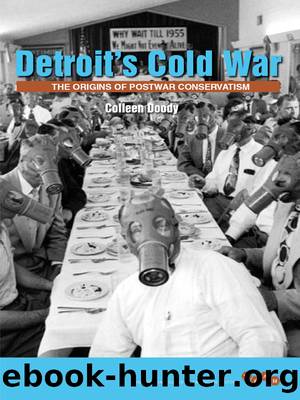Detroit's Cold War: The Origins of Postwar Conservatism by Colleen Doody

Author:Colleen Doody [Doody, Colleen]
Language: eng
Format: epub
Tags: Labor & Industrial Relations, United States, Civil Rights, 20th Century, Political Science, History, General
ISBN: 9780252094446
Google: OsCjuU5CUdEC
Goodreads: 22329684
Publisher: University of Illinois Press
Published: 2012-11-01T00:00:00+00:00
Building Community
Many Catholics also worried that the culture of the Detroit area had become highly secular. The Detroit area in the 1940s and 1950s had the characteristics of a boomtownâmassive influx of people, rapid turnover in some neighborhoods, and tension between long-time and newer residents.59 In addition, thousands of white Detroiters left the city for the suburbs during these decades. As a result, the public sphere was in flux. Different groupsâlabor unions, African Americans, small businessmen, Communist Party members, churchgoersâall fought to control the public discourse and assert their ideas. Catholics proclaimed their cultural values in this rapidly changing community by building churches in new suburbs and by sharing Rosary devotions with their neighbors.
Catholics in these new communities faced far different problems than those they had confronted in the prewar city. On the one hand, Detroit residents were moving out of the ethnic enclaves into areas that lacked the tight Catholic subcultures of the old neighborhoods.60 This created a problem for the American church, since Catholicism stresses the communitarian nature of society. Traditional Catholic values emphasize the network of social connections in which each person exists. In the new suburban communities, these social connections could be disrupted. Catholics in the suburbs were far more likely to live in close proximity with non-Catholics and their supposedly secular, materialistic values. Many Catholic commentators worried that, as Catholics moved into neighborhoods and worked in corporations next to Protestants, Catholics would seek to fit in by no longer attending mass. In addition, postwar affluence created a crisis for Catholics since materialism and consumerism potentially weakened spirituality and piety. In reaction to these two related threats, the hierarchy and the laity helped create a new Catholic community in the suburbs.61 The most tangible manifestations of this community building were the eighty-two new parishes the Detroit archdiocese built between 1945 and 1958.62 The Michigan Catholic continually urged classified-ad readers to âLook here for homes in Catholic parishesâ and regularly published articles and photo spreads of the new suburban churches and schools. Developers often included the names of the new churches in their ads for suburban communities in hopes that Catholics would be more likely to move into areas with established parishes.
The hierarchy and the laity jointly formed devotional cultures in these new communities. The archdiocese recognized that âif our Catholic people remain disunited in their sacrificial actions, they will probably also remain disunited and ineffectual in their thinking, their planning and in their influence upon their community.â63 The Americanized descendants of immigrant Catholics participated in creating this new Catholic culture by flocking to church in even greater numbers than their ancestors had. According to the Detroit Area Study, only 58 percent of first-generation Catholic immigrants reported attending church every week while 79 percent of second-generation Catholics and 85 percent of third-generation or beyond went to mass weekly.64 These Americanized Catholics also participated in a variety of devotions, and they used these devotions to critique and reshape American culture. As Robert Orsi has pointed out, second- and
Download
This site does not store any files on its server. We only index and link to content provided by other sites. Please contact the content providers to delete copyright contents if any and email us, we'll remove relevant links or contents immediately.
Warrior Queens & Quiet Revolutionaries by Kate Mosse(350)
A Rome of One's Own by Emma Southon(306)
Executive Order No. 9066: The Terrible Injustice Of 1942 by Sollace Freeman(300)
Respectability and Reform by Tara M. McCarthy(296)
The Evidence of Things Not Seen by James Baldwin(294)
The Explorers by Amanda Bellows(266)
A Wider Type of Freedom: How Struggles for Racial Justice Liberate Everyone by Daniel Martinez HoSang(230)
Letters From London by Julian Barnes(218)
The Grey Eagles of Chippewa Falls by John E. Kinville(212)
The Crosswinds of Freedom by James MacGregor Burns(210)
Liberty's Dawn: A People's History of the Industrial Revolution by Emma Griffin(203)
Rethinking White Societies in Southern Africa by Duncan Money(202)
A Troublemaker May Surprise (The Troublemaker Series Book 2) by Genta Sebastian(197)
Evolution of Slavery Through the Ages: A Comprehensive World History of Slavery by PRESS VERITY(185)
The Slave Ship, Memory and the Origin of Modernity by Martyn Hudson(177)
Continental Strangers by Gemunden Gerd;(173)
A Teacher's Guide to Ladies of Liberty by Cokie Roberts Amy Jurskis(172)
Beware the Masher by Kerry Segrave(162)
Hunger Dark Pen by Dark Pen(159)
